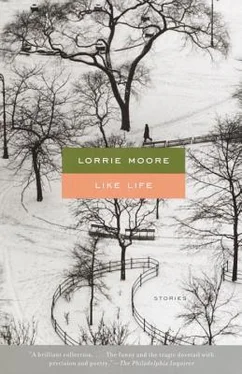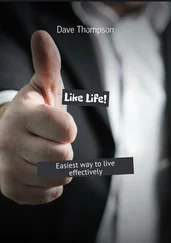“I was in high school. Some guy called me a Jew, and I went after him. But I was clumsy and fat. He broke a bottle and dragged it across my face. I went home and my grandmother nearly fainted. Funny thing was, I had no idea that I was Jewish. My grandmother waited until the next day to tell me.”
“Really,” said Odette.
“You have to understand midwestern Jews: They’re afraid of being found out. They’re afraid of being discovered.” He breathed steadily, in and out, and the window shade flapped a little from being over the radiator. “As you probably know already, my parents were killed in the camps.”
Odette did not say anything, and then she said, “Yes. I know.” And at the moment she said it, she realized she did know, somehow had known it all along, though the fact of it had stayed beneath the surface, gilled and swimming like a fish, and now had burst up, gasping, with its mouth wide. “Are you really leaving on Friday?” he asked.
“What?”
“Friday. Are you?”
“I’m sorry, I just didn’t hear what you said. There’s wind outside or something.”
“I asked you if you were really leaving on Friday.”
“Oh,” she said. She pressed her face hard into his neck. “Why don’t you come with me?”
He laughed wearily. “Sure,” he said. “All right,” knowing better than she at that moment the strange winding line between charity and irony, between shoplifting and love.
During that last day she thought of nothing but him. She packed and cleaned out her little apartment, but she had done this so often now in her life, it didn’t mean anything, not in the pit of her, not anything she might have wanted it to mean.
She should stay.
She should stay here with him, unorphan him with love’s unorphaning, live wise and simple in a world monstrous enough for years of whores and death, and poems of whores and death, so monstrous how could one live in it at all? One had to build shelters. One had to make pockets and live inside them. She should live where there were trees. She should live where there were birds. No bird, no tree had ever made her unhappy.
But it would be like going to heaven and not finding any of your friends there. Her life would go all beatific and empty in the eyes. And if he came to New York, well, it would bewilder him. He had never been before, and no doubt he’d spend all his time staring up at the skyscrapers and exclaiming, “Gosh, look how tall those suckers are!” He would slosh through the vagrant urine, shoelaces untied. He would walk through the dog shit awaiting him like mines. He would read the menus in the windows of restaurants and whistle at the prices. He would stare at a sidewalk drunk, prone and spread-eagled and fumbling at the crotch, and he would say, not unkindly, “That guy’s really got his act together.” He would look at the women.
And her restlessness would ripple, double, a flavor of something cold. She would turn from him in bed, her hands under the pillow, the digital clock peeling back the old skins of numbers. She would sigh a little for the passage of time, the endless corridor of it, how its walls washed by you on either side — darkly, fast, and ever, ever.
“WHAT DO YOU DO, you stay overnight on the road somewhere?” he said, standing next to her car in the cold. It was Friday morning and spitting snow. He had come over and helped her load up the car.
“I drive until dark, then I check into a motel room and read until I fall asleep. Then I get up at six and drive some more.”
“So, like, what are you bringing with you to read?” he asked. He seemed unhappy.
She had a Vogue magazine and The Portable Jung. “Something by Jung,” she said.
“Jung?” he asked. His face went blank.
“Yeah,” she sighed, not wanting to explain. “A book he wrote called The Portable Jung. ” She added, “He’s a psychologist.”
Pinky looked her deeply in the eyes. “I know,” he said. “You do?” She was a little surprised.
“Yeah. You should read his autobiography. It has a very interesting title.”
She smiled. “Who are you? His autobiography? Really?”
“Yeah,” said Pinky slowly. “It’s called Jung at Heart. ” She laughed loud, to please him. Then she looked at his face, to fix him like this in her mind. He was wearing a black shirt, a black sweater, black pants. He was smiling. “You look like Zorro today,” she said, strangely moved. The spidery veins at his temples seemed like things under water, tentacular and drowned. She kissed him, long and at the rim of his ear, feeling in the rolls and spaces of her brain a winding, winding line. She got into the car. Though she hadn’t even started up the engine, her departure had already happened, without her, ahead of her, so that what she now felt was the taunt of being left behind, of having to repeat, to imitate, of having to do it again, and now, and again.
“All this wandering that you do,” he said, leaning in the window, his face white as a cream cheese, his scar the carved zigzag of a snowmobile across a winter lake. Wind blew handsomely through his hair. “How will anyone ever get close to you?”
“I don’t know,” she said. She shook his hand through the window and then put on her gloves.
And she thought about this all across Indiana, beneath the Easter hat of sunset that lit the motel roof in Sandusky, through the dawn of Pennsylvania, into which she soared like a birth — like someone practicing to be born. There were things she’d forget: a nightgown stuck on a hook behind the bathroom door, earrings on the motel nightstand. And all love that had overtaken her would have to be a memory, a truck on the interstate roaring up from the left, a thing she must let pass.
She would park the car right off Delancey Street; there would be a spot across the street from the hotel with the Pepsi sign and HOTEL in lights beneath. All night, sirens would keen, and traffic would whoosh and grind its way down Houston, down Canal, toward the Holland Tunnel — a bent sign to which aimed straight at her window. She would get up in the morning and go for sundries; at the corner bodega the clerk would mispress the numbers on the register, and the toothpaste would ring up at $2,000. “Two thousand dollars!” the clerk would howl, standing back and looking at Odette. “Get a real toothpaste!” From a long distance, and at night, a man would phone to say, doubtfully, “I should come visit on Valentine’s,” history of all kinds, incongruous and mangling itself, eating its own lips.
If she had spurned gifts from fate or God or some earnest substitute, she would never feel it in that way. She felt like someone of whom she was fond, an old and future friend of herself, still unspent and up ahead somewhere, like a light that moves.
DENNIS’S EX-WIFE had fallen in love with a man she said was like out of a book. Dennis forgot to ask what book. He was depressed and barely dating. “I should have said to her, ‘Yeah, and what book?’ ” Dennis was always kicking himself on the phone, not an easy thing, the tricky ouch of it. His friend Mave tended to doodle a lot when talking to him, slinky items with features, or a solitary game of tick-tack-toe. Sometimes she even interrupted him to ask what time it was. Her clock was in the other room.
“But you know,” Dennis was saying, “I’ve got my own means of revenge: If she wants to go out with other men, I’m going to sit here and just let her.”
“That’s an incredibly powerful form of revenge,” said Mave. She was not good on the phone. She needed the face, the pattern of eyes, nose, trembling mouth. When she was on the phone she often had to improvise Dennis’s face from a window: the pug nose of the lock, the paned eyes, the lip jut of the sill. Or else she drew another slinky item with features. People talking were meant to look at a face, the disastrous cupcake of it, the hide-and-seek of the heart dashing across. With a phone, you said words, but you never watched them go in. You saw them off at the airport but never knew whether there was anyone there to greet them when they got off the plane.
Читать дальше












